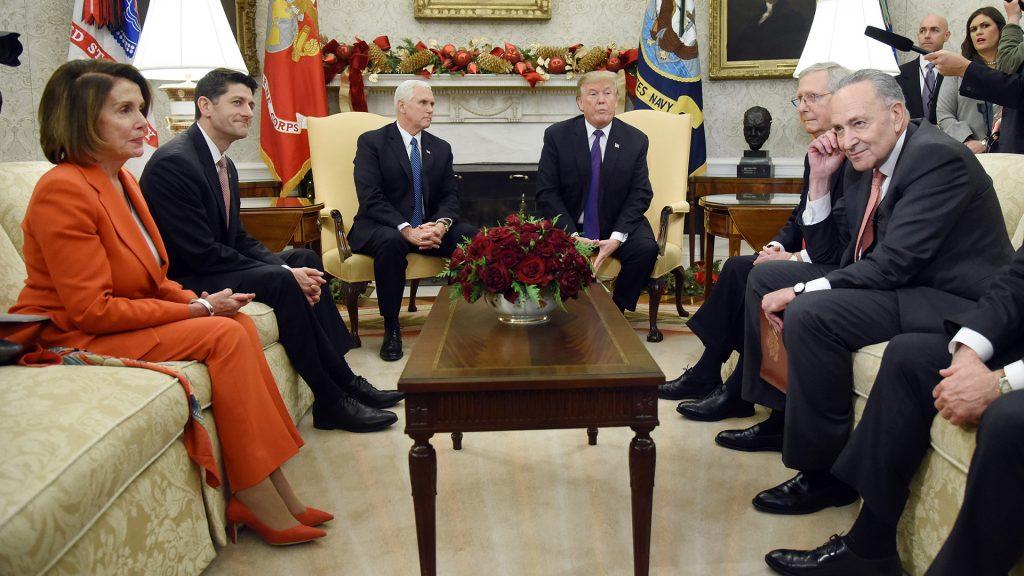McComas: Delaying the State of the Union is the right thing to do
Speaker Pelosi was justified in postponing the State of the Union Address until after the government shutdown.
U.S. President Donald Trump and Vice President Mike Pence look on during a meeting with Congressional leadership including House Minority Leader Rep. Nancy Pelosi (D-Calif.), House Speaker Paul Ryan (R-Wis.), Senate Majority Leader Mitch McConnell, and Sen. Charles Schumer (D-NY) in the Oval Office of the White House Thursday, Dec. 7, 2017 in Washington, D.C. (Olivier Douliery/Abaca Press/TNS)
January 31, 2019
Among a 35-day government shutdown, a 21-day temporary reopening, and a persistent battle over border-wall funding, the State of the Union Address is in much different standing than it was a month ago.
The state of the American government over the past month has highlighted many uncertainties in the way it operates in out-of-ordinary circumstances. The annual State of the Union is one of these uncertainties that has generated a discussion over whether the president has the authority to give such an address when the government is shut down.
The Constitution does grant the president the power to, from time to time, give Congress information on the state of the union, but the parameters of this constitutional clause are fuzzy. Is it sensible for the president to give such an address when the government is experiencing a political crisis?
No. Ultimately, fixing the government has priority over fashioning a speech that iterates the mess that the government is in.
RELATED: Community organizers rally around federal workers after shutdown
The president has the duty to solve the issues at hand before he can recommend policy to Congress. In the recent shutdown, the legislative and executive branches of government failed to agree on funding for President Trump’s initiatives regarding border security, so what use would it be for Congress to hear more about the recommendations that led to federal conflict in the first place?
If Trump had given the State of the Union Address on its original date (Jan. 29), it would have accomplished nothing. Because the president uses the State of the Union to recommend an agenda for Congress, an address then would have been useless. Consisting mostly of rhetoric and bias, I imagine that the State of the Union would have remained unclear and wasted time that could have been used on finding solutions in the government disaster.
House Speaker Nancy ’s suggestion to postpone the original address because of the shutdown was initially battled by Trump’s persistence to give the address to Congress on its scheduled date, but he eventually agreed that the decision to reschedule was reasonable.
Mr. President, I hope by saying “near future” you mean you will support the House-passed package to #EndTheShutdown that the Senate will vote on tomorrow. Please accept this proposal so we can re-open government, repay our federal workers and then negotiate our differences. https://t.co/57KMATZZTO
— Nancy Pelosi (@SpeakerPelosi) January 24, 2019
This was not a dig at the president. Pelosi was not attempting to “troll” the president but to make the most out of the address and save it for a time when he could focus on the future instead of a proposal that has made national news every day for 35 days.
RELATED: Cartoon: Shutdown does not equal anarchy
In situations in which Congress and the president have a contentious relationship, it is sensible to reschedule an important and traditional speech such as the State of the Union to a time where the president can speak for more than just his own branch of government.
The State of Union, as we’ve seen annually, is one that brings the government together and moves the country forward. By postponing the address until after an event such as the shutdown, the president has the platform to discuss topics other than the issues that prompted the shutdown.
As the government launches its reopening, the State of the Union is now scheduled for Feb. 5. The rescheduled date is beneficial for both Trump and Congress, because it sets the stage for a new year and fresh policy rather than a reflection of conflict.






